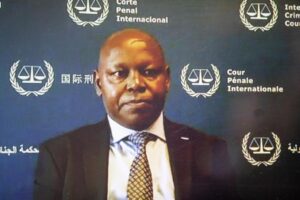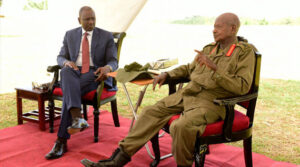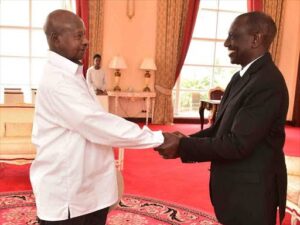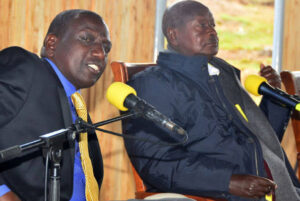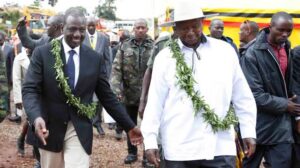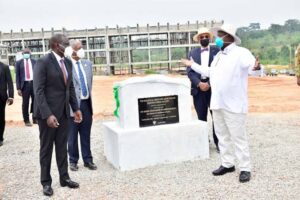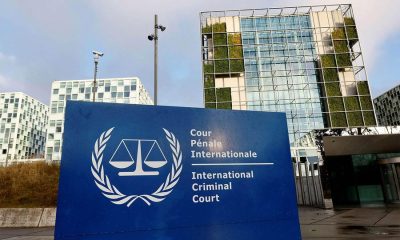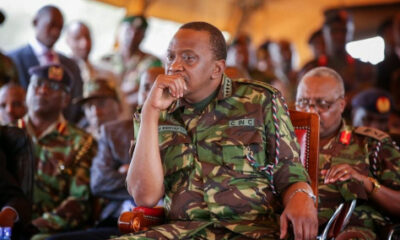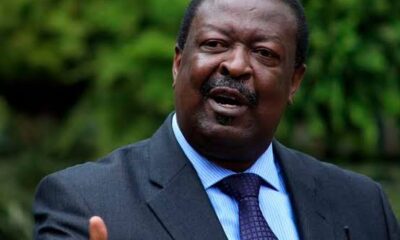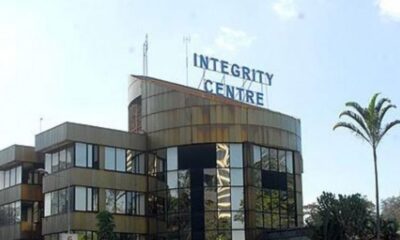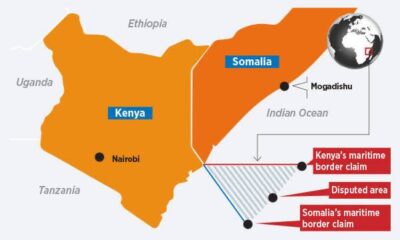Politics
Why 2022 Presidency Win Is a DO-or-DIE for Deputy President William Ruto.
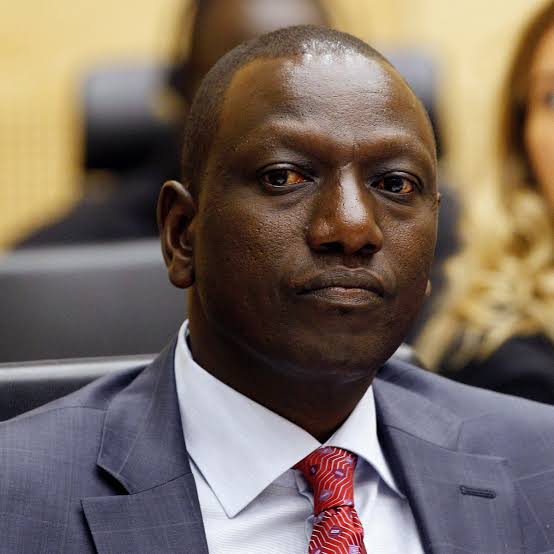
Deputy President of Kenya William Ruto apparently is a desperate man appearing strong when weak to confuse the enemy. DP Ruto who is walking on a tight rope with an option either to steadily balance himself through to reach the finishline or mess along the way and fall into Scheveningen, The Hague . He has been a hard rock to his Political competitors and pepper to his critics. A one-man-army against heavyweight political bigfish in the country who are maneuvering left, right and center trying to form alliances to spearhead a force to break his bubble.
DP Ruto is the most embattled political heavyweight in Kenya marinated with tremendous corruption allegations, extrajudicial killings to maim his critics that jeopardize his political moves.
Since the surrender of one of his right hand man Lawyer Paul Gicheru to ICC, he (Ruto) is a man whose spirits are in limbo and seems the only option to sort his mess out is winning the Presidency, of which is likely to be through ballot or by bullet.
Mid this month – 15th July, the International Criminal Court (ICC) confirmed charges against Kenyan lawyer Paul Gicheru for allegedly corruptly influencing witnesses. Gicheru surrendered after five years on the run for interfering with witnesses in the 2007/08 post-election violence cases. Some of the witnesses said that they were initially bribed by the prosecution to testify against Ruto and Sang.
The court had issued arrest warrants for three Kenyans — Walter Barasa, Gicheru and Phillip Bett — on charges of obstructing the course of justice. This was after chaos erupted on December 31, 2007, after the announcement of Mwai Kibaki as the presidential poll winner in a race he closely contested with ODM leader Raila Odinga. Over 1,500 people were killed, 650,000 people were displaced. Following the chaos, DP William Ruto was charged with crimes against humanity alongside journalist Joshua Sang and former ODM chairman Henry Kosgey. The general charges also applied to President Uhuru Kenyatta, Francis Muthaura, and former police commissioner Mohammed Hussein Ali.
The ‘Ocampo six’ were accused of murder, deportation or forcible transfer of population, persecution, rape, and other inhumane acts during the poll chaos. ICC terminated the case against Ruto and Sang on April 5, 2016, about a year after President Kenyatta’s, which was dropped on March 13, 2015. In this case, 17 witnesses who had agreed to testify against the accused subsequently withdrew their cooperation with the Court.
Prosecution witnesses, in this case, were subjected to intimidation, social isolation and threats to prevent them from testifying. The ICC issued an arrest warrant against Gicheru after it was established that from at least April 2013, a criminal scheme was designed to systematically approach and corruptly influence witnesses of the Prosecutor through bribery and other methods of inducements in exchange for their withdrawal as prosecution witnesses and/or recantation of their prior statements to the Prosecutor.
The evidence indicated that the said scheme had been run in an organised manner and with a clear distribution of tasks. Gicheru was said to be a manager and coordinator of the scheme, meaning that he had finalised agreements with corrupted witnesses, organised the formalisation of their withdrawal and handled the payment. But the ICC stated that there was no evidence that Ruto or Sang directly interfered with the witnesses.
On 15th July this year, The International Criminal Court (ICC) confirmed charges against Kenyan lawyer Paul Gicheru who will now stand trial over alleged witness tampering. The ICC, in a statement posted on its website on recently, said Judge Reine Adélaïde Sophie Alapini-Gansou of Pre-Trial Chamber A reached the decision upon going through evidence and submissions presented by both the Prosecutor and the Defence. The court believes lawyer Gicheru committed offences against the administration of justice in order to undermine the Prosecution’s case against Deputy President William Ruto and radio presenter Joshua arap Sang.
Before Eldoret-based lawyer Paul Gicheru lurched into William Ruto’s case at the International Criminal Court, the former prosecutor, Fatou Bensouda, had pegged her hopes on several key prosecution witnesses. Then Mr Gicheru embarked on what the ICC calls the “witness corruption scheme”, and soon witnesses started withdrawing in quick succession. Some recanted their statements. Others disappeared. Now the ICC and its Pre-Trial Chamber have laid bare the case facing Mr Gicheru.
While court documents adversely mention Deputy President William Ruto as one of the people in the scheme of things, the ICC has not demanded Mr Ruto’s appearance. In 2015, the Prosecutor, frustrated with the Kenyan case, named Mr Gicheru as one of the men behind the witness interference plot. Gicheru fought back attempts to have him extradited to The Hague, with High Court judge Luka Kimaru quashing the warrant of arrest issued by Justice Ekaterina Trendafilova on both the lawyer and Mr Philip Kipkoech Bett.
But in November 2020 Mr Gicheru, 51, surprised many when he turned himself in to Dutch authorities to face accusations at the ICC which carry a prison sentence of up to five years. He is facing 16 counts.
In July 15, 2021 — the ICC Pre-Trial Chamber, while confirming the charges against Mr Gicheru, said it “is convinced that between April 2013 and January 2014, Mr Gicheru offered various witnesses (millions of shillings) in cash instalments in exchange for withdrawing as Prosecution witnesses in the Ruto and Sang case”. The decision on the confirmation of the charges only serves to determine whether the Prosecutor’s case should proceed to trial.
The Pre-Trial Chamber also found that besides Mr Gicheru, there was Mr Silas Simatwo, from Amaco Insurance, a Mr Maiyo, Mr Bett, a Mr Yebei and Mr Walter Barasa, who acted together to undermine the prosecution’s case against Ruto and Sang.
The Prosecution, according to documents tabled at the Pre-Trial Chamber, plans to reveal the level of witness interference in the Ruto case and claims that the Deputy President was privy to what was happening.
While both Mr Ruto and President Uhuru Kenyatta had been charged at The Hague with crimes against humanity, the case against Mr Ruto was only vacated “without prejudice to their prosecution afresh in the future”.
The majority noted at the time that Mr Ruto had “profit(ed) from the interference (of witnesses) by the falling away of several key witnesses that the Chamber found to have been interfered with”. On March 13, 2015, Trial Chamber V(B) terminated the proceedings against Mr Kenyatta upon the Prosecution’s notice of withdrawal of charges due to insufficient evidence.
The Pre-Trail Chamber in the Gicheru says there was a well-planned scheme to induce the witnesses in the Ruto case that involved a first contact with a person who already knew the witness, a meeting with Mr Gicheru, making of an offer, and, finally, intimidation of the witness.
In order to prosecute its case, the prosecution divided the group of offenders into ‘managers’ and ‘intermediaries’ of the common plan. The Pre-Trial Chamber also found that “the (managers) also had a particular proximity with Mr Ruto and seemed to enjoy a special status in comparison with other members of the common plan organisation”.
Mr Simatwo is identified in the Chamber ruling as “in charge of the treasury” and that “several witnesses refer to them as the ‘core’ of the common plan organisation, or ‘the people’ working for Mr Ruto in order to corrupt witnesses”. Mr Simatwo is also identified as the head of the African Merchant Assurance Company, “an insurance company to which Mr Ruto was a shareholder”.
The Pre-Trial Chamber was told that Witness P-0341 was sent abroad to look for witnesses and was to be given a “car, another farm, a plot in town and Sh5 million”. The Chamber has been told that “Mr Ruto… was happy that P-0341 had agreed… not to attend ICC meetings anymore”. It was after this meeting that P-0341 was told that Mr Gicheru “would be the focal point now” and “would deal with everything”, according to court records.
It all seems to have started in April 2013, when the witness corruption scheme was laid. The first payment to P-0397, according to the Chamber, was for Sh1 million. In a heavily redacted ruling, the Chamber says that on or about April 20, 2013, the key witness was “visited” by a person –whose name has been redacted — and it was explained to him “that there was a group of persons working for Mr Ruto who were instructed to identify ICC witnesses and offer them money in exchange for their withdrawal as Prosecution witnesses.”
According to the Chamber records, the witnessed was introduced to Mr Gicheru on or about April 26, 2013 and he spoke to the witness “privately.” “(The Witness) told Mr Gicheru that he was an ICC witness, to which Mr Gicheru added that he had heard,” the chamber quotes filings by the Office of the Prosecutor in file KEN-OTP-0125-0434-R01.
“Mr Gicheru asked P-0397 to assist him by withdrawing as a witness against Mr Ruto. Mr Gicheru told P-0397 that Mr Ruto wanted P-0397 to identify other Prosecution witnesses and bring them to him (Mr Gicheru),” the file notes.
At first, according to the Chamber evidence, the witness requested for Sh10 million after Mr Gicheru asked him to “state his price in exchange for his withdrawal”. During the discussion, Mr Gicheru was joined by another person, whose name is also redacted, and Mr Gicheru explained to the witness that the person “must be consulted regarding the money to be paid to witnesses”.
Mr Gicheru is alleged to have explained to the witness “that Mr Ruto had given him and (the person whose name is redacted) the authority to pay witnesses”. After negotiations, the Chamber has heard, the witness was promised Sh5 million, “which Mr Gicheru promised would be paid in cash”. As they parted, Mr Gicheru gave the witness a business card.
He “in turn handed it to Prosecution investigators”, according to the Chamber. A day after Mr Gicheru privately spoke to the witness, he is said to have paid a cash instalment of Sh600,000. While the witness had been warned not to deposit the money into his bank account “to avoid detection by the ICC people”, the witness kept Sh100,000 and deposited Sh500,000. “He did so as he was afraid of getting robbed,” says the OTP filings quoted by the Chamber.
A week after this initial payment, Mr Gicheru, according to Chamber filings, introduced the witness to a lawyer who was to prepare an affidavit for the ICC. The chamber now says “(the witness) signed a letter giving (the lawyer) the power to act for him before the ICC on this matter. On the same day, (the witness) also signed an affidavit stating that he no longer intended to “testify against any accused persons” before the ICC, which the Chamber understands to include Mr Ruto and Mr Sang, and wished to withdraw his testimony against them”.
Some eight months after the affidavit was sent to the Prosecution by the lawyer, whose name is still redacted, Mr Gicheru is now said to have met the witness on December 7, 2013 and asked him if he was still in touch with the ICC. The Prosecutor alleged that Mr Gicheru “accused him of wanting, along with other individuals, to send Mr Ruto to jail. Mr Gicheru became aggressive; indicating that he believed (the witness) was trying to have him arrested by the ICC”. According to the filings, “the meeting ended when Mr Gicheru was calmed down by the second man and (the witness) left the meeting”. As a result of this exchange, (the witness) felt that he was in danger and could be killed.
When another witness, named P0516, disappeared on July 6, 2014 on the day he was scheduled to meet ICC officials regarding his in-court testimony, the Trial Chamber in the Ruto and Sang case was forced to issue a summons for his appearance before it declared him a hostile witness.
This Witness 2, identified as P0516 in court papers, told the ICC during Ruto’s case that the evidence that he had provided in his original witness statement was false, and that he had been told by a person, whose name is now redacted, on what to say. He also, under oath, testified that he did not know a lawyer named Paul Gicheru. But the prosecution said that it was Mr Gicheru who directed a person, whose name is redacted, to locate Witness 2. And since this person said he was not in good terms with this particular witness, they instructed (Prosecution Witness P-0397) to locate and bring him to the group on the promise that he would receive additional money.
According to the court filings, P-0397 told (Witness 2) that he could get money, such as Sh500,000, but that he had to meet and talk with Mr Gicheru first. (Witness 2) agreed to P-0397’s proposal to meet Mr Gicheru and they had a private discussion. It is now alleged that during the first or second meeting, Mr Gicheru offered Witness 2 some Sh800,000 in exchange for his withdrawal as a witness from the main case. “Mr Gicheru met with P-0516 approximately four or five times and paid him a total of at least Sh500,000,” the Chamber has been told.
After Witness 2 withdrew as a prosecution witness, the court filings state that “he stopped going to (name redacted) to receive money, despite being paid less than originally promised, because it was becoming dangerous”. P-0397 told prosecutors that he did not receive his part for introducing Witness 2 to Mr Gicheru. While confirming the case against Mr Gicheru, the Chamber says it finds the allegations regarding Mr Gicheru’s payments to (Witness 2) in exchange for withdrawing as a prosecution witness are corroborated by P-0397 as well as by other witnesses. It further says that it will assess the credibility of the witness as well as the evidence to draw its own conclusions. “He seemed not entirely forthright, specifically regarding the extent and purpose of his interactions with Mr Gicheru and his contact with P-0613 (who testified for Prosecution),” the Chamber observes, and says that “those elements support the reliance on portions of P-0516’s statements from (redacted) to the effect that he was promised and paid money by Mr Gicheru to withdraw as a Prosecution witness”.
While Gicheru’s defence dismissed these witnesses as “unreliable” by referring to the conclusions reached by the Chamber in the Ruto case which dismissed P-0613’s evidence as uncorroborated hearsay, the Chamber noted that this witness’s evidence stems from her phone conversations as well as text messages that she received from unidentified senders from April to September 2013. The Chamber, by agreeing to rely on her evidence in the Gicheru case, said the judges’ findings in the Ruto case on this witness’s evidence “related to the sufficiency of her knowledge” and that the charges now brought by the prosecutor in this case are different. “The Chamber will assess the credibility of P-0613 as well as her evidence independently and will draw its own conclusions,” the Judges have ruled. “The Chamber further finds that P-0613 also provides direct evidence of attempts by certain individuals to corruptly influence her decision to testify as a Prosecution witness, and that parts of her accounts are corroborated by other evidence.” And on her general evidence, the Chamber said it had found that this witness’s evidence fits the overall pattern that emerges from the evidence regarding how individuals were approached and in turn approached other potential prosecution witnesses to arrange meetings with individuals such as Mr Gicheru in order to offer the prosecution witnesses or potential witnesses money in exchange for their withdrawal and recantation of prior statements given to the Prosecution.
On her credibility, the Judges said that Gicheru’s defence “does not put forward any persuasive factors that would affect the reliability of her statements. “P-0613’s statements are internally consistent, free of contradictions and, as already mentioned, they are partially corroborated by other evidence,” they found. “Accordingly, the Chamber finds P-0613 credible and her statements reliable.”
It also emerged that after another witness, P-0604, recanted his evidence at The Hague, after what the prosecutor terms as “improper interference”, he later resumed his contacts with the Prosecution and will now be used in the Gicheru case. The Chamber formed the view that this witness “can be, in part, relied upon in the case at hand, including from his statement of 2013”. According to the Chamber, this witness was introduced to Mr Gicheru and asked to withdraw his statement in exchange for money and was coached on what to say in court by Mr Gicheru and another lawyer.
The ICC judges who have listened to the Gicheru confirmation case say they have now formed the view that this witness, together with two others and “some anonymous actors working individually or in pairs and even competing against each other” attempted to convince witness P-0613 to withdraw as a prosecution witness. Witness P0613 learnt about the witness corruption scheme from other witnesses, according to the Chamber. From the court records, this witness was approached by P-0495 and asked to accept a cash offer. “P-0495 explained that ‘they’ were interested in suspending the main case because it was taking too long and their objective was to stop it. He told P-0613 that she would be provided with government protection so that she could defect and be protected from others too,” the Chamber noted in its ruling. While this witness never met Mr Gicheru, the Chamber says it is “convinced that Mr Gicheru was involved in attempts to convince P-0613 to withdraw as a prosecution witness in exchange for financial incentives and other advantages.” Mr Gicheru, according to the Chamber, met with P-0800 on July 21, 2013 and offered him money “in locating and corrupting other witnesses, notably P-0613”.
The Chamber identified Mr Bett as the person who took P-0800 to a meeting with Mr Gicheru in Nairobi. During the meeting, Mr Gicheru offered to give P-0800 between Sh1.5 million to Sh2 million. From the interaction, P-0800 got the impression that the money was offered in exchange for being loyal to the Gicheru team and agreeing with what they were going to tell him, the court notes. “During the same meeting, P-0800 was immediately incorporated into plans to interfere with other witnesses. Mr Gicheru asked P-0800 to contact P-0495 and facilitate a meeting between the latter and Mr Gicheru. P-0800 was given travel money by Mr Gicheru to go… and meet with P-0495,” says the court. Gicheru would later take P-0800 to a law firm where he signed an affidavit. The witness told the prosecutors that he “signed the last page of the affidavit without ever reading the entire document” and that he “feared negative consequences if he didn’t”. Initially, the Chamber had noted, this witness had broken contacts with the ICC but in 2014 he resumed the cooperation and testified in November 2014. Mr Gicheru has also been mentioned by P-0536, who is described by the Chamber as “always straightforward in her statements and interactions with the prosecution”. The witness, now adopted as credible, had been promised Sh1.4 million and in one conversation the amount was increased to Sh1.6 million. An unidentified person told her that the money would be paid in cash and “meant to start a new life”. Mr Gicheru is also said to have approached P-0341 and inquired if he was an ICC witness.
In May 2013, Mr Gicheru is said to have paid this witness Sh500,000 and asked him not to deposit the money into a bank. But the witness opened a bank account and deposited Sh300,000 and spent the balance. After that, he was taken to a lawyer and he signed an affidavit of withdrawal from the entire ICC process. He was asked to bring another unnamed witness, make a public statement to the press about his withdrawal and he would be paid Sh5 million. It is also claimed that Mr Ruto “complained many times to Mr Gicheru” about an issue that has been redacted. The witness continued to meet “almost every day” with Mr Gicheru and between May 9 and July 19, 2013 he signed an affidavit stating that he had no evidence against Mr Ruto and that he was withdrawing from the case.
The ICC noted that a few days later, Mr Gicheru told P-0341 that Mr Ruto was very happy with the affidavit and that P-0341 should receive Sh5 million for that. On that day, however, Mr Gicheru gave him a smaller amount, but superior to Sh20,000. The court was told that Mr Gicheru wanted the man to be Mr Ruto’s witness. Gicheru continued to spend money on this witness, according to court records, with most of it banked into the witness’ account. On two occasions, according to the Chamber, Mr Gicheru summoned P-0341 because he was furious that P-0341 had attended a PEV victims meeting and had met with (redacted). Mr Gicheru accused him of interacting with white people who were spies for the ICC. In total, this witness is reported to had received Sh2 million from Mr Gicheru. It was this witness who brought a former PNU supporter to Mr Gicheru who explained that they were “giving witnesses money to stop assisting the ICC, and that they needed to reach everyone involved in this case since ‘the boss’, who P-0274 understood to be Mr Ruto, ‘wanted no stone left unturned”. “Mr Gicheru also asked P-0274 to give him the names of other OTP witnesses. Mr Gicheru gave P-0274 a phone number from which he said he would call P-0274 in the future. Mr Gicheru also gave him some money to reimburse him for transport back home. Feeling ‘very sceptical about all this’, P-0274 reported what had happened to an ICC staff member,” the ICC prosecutor told the court.
The Chamber was told that P-0274 received a call from the number and was to meet Mr Gicheru. Scared, the witness switched off his phone. “When he switched his phone back on, he saw that he had received a new threat from another telephone number. After that, he never dealt with Mr Gicheru again,” says the prosecution. Later, P-0274 was told by an unnamed person that “Mr Ruto wanted to meet him in person.” The Pre-Trial Chamber has now identified Mr Gicheru as a co-perpetrator and has also retained the charges of direct perpetration as requested by the Prosecution. On the others who are yet to surrender to The Hague, the Chamber said that “by the very nature of their tasks (directly bribing witnesses), it cannot be said that they were mere executors who did not know what the common plan was about. On the contrary, by the very nature of their action and awareness of the consequences of the implementation of the common plan, they became participants and members of the common plan organisation.
Head of State Immunity.
The provision in Article 27(2) of the ICC Statute that “Immunities or special procedural rules which may attach to the official capacity of a person, whether under national or international law, shall not bar the Court from exercising its jurisdiction over such a person” , according to the summary of the judgment.
Literally Head-of-state immunity is a doctrine of customary international law — the doctrine maintains that a head of state is immune from the jurisdiction of a foreign state’s courts, at least as to authorized official acts taken while the ruler is in power.
The ICC’s success has been questioned by many and the Al-Bashir situation placed a major obstacle in ICC’s jurisprudence regarding immunity to heads of state. Article 27 of the Rome Statute states that no position of authority of an individual, shall bar the Court from exercising jurisdiction.
However, Article 98 of the Rome Statute confers that the Court may not proceed with a request for surrender, if this would require the requested state to act inconsistently with international law obligations pertaining to immunity of officials in relation to a third state. Article 98 is interpreted such that it applies to non-state parties since the members have not ratified the Rome Statute and thus are not bound by the obligations created by Article 27.
Immunity to heads of state is well recognized in international customary law. Putting the concerns into context, Sudan is not a party to the ICC. Bashir, at the time, travelled to many countries within the African Union – wherein States refused to extradite him to the ICC, due to the immunity his position confers on him. Since Sudan’s referral to the ICC is made by the UNSC, not only does Article 27 apply but also Article 98 (1) which would consequently, create serious doubts on the prohibition of head of state immunity for Al Bashir.
Due to the lack of clarity of the situation, the African Union (AU) have been looking at the option of an advisory opinion from the ICJ on the matter. Some countries of the AU have even threatened to withdraw from the ICC which makes the matter extremely complicated.
In the case of then Sudan Head of State Omar Al bashir, where ICC ordered his arrest and whereby the 122 member states were to act on behalf of ICC to aid in the arrest of the then Sitting Head of State should he visit any of the member state. Omar however managed to visit 10 member states who declined to arrest him on the ground of International Customary laws.
There haven’t been a clear jurisdiction as to if ICC can arrest and prosecute a non-member sitting Head of state should need be and with the help of the member states should the wanted head of state enter any of the member state territory. There have been divided legal opinion whether to adhere to ICC’s non-immunity law or International Customary Law that bars ICC’s directive.
At some point African Union through UN- General assembly on behalf of member state set to challenge ICC’s Appeal chamber ruling on ‘No- immunity’ against sitting head-of-states to International Court of Justice (ICJ) to determine whether to uphold Customary law for all or ‘No-immunity’ ICC’s law. African Union prohibits prosecution or conviction of a sitting Head-of-state.
Since the ICC is an international organization, not a State, the consistency of its actions with customary international law can only be determined by the reactions of States. As per the current status quo- some member states are not upto the task to act on ICC’s request to make such arrest should there need be. Should the decision be made clear by ICJ, ICC member states will have no option but to adhere. This is a case yet to be determined.
With DP Ruto as head-of-state and should Lawyer Gicheru admission expose rekindle Ruto’s ICC case, he’ll be enjoying the immunity unlike if he’ll be out of the office.
With General elections just few months away and with 9.5 percent probability of his ICC case being rekindled, Ruto, the favorite candidate likely to win Kenya’s Presidential election not on Integrity ground but symphathy and smartness in the political umbrella will likely be out and about to use every available resources to clinch the seat. And should he clinch the seat, he’ll use every available resources at his disposal like every other African Head-of-State to cling into power for another 5 years. Enough time to meddle African Union business to influence ICJ and ICC whose current prosecutor Karim Khan was his former lawyer in the same court —or through his government push for withdrawal of Kenya from ICC like his Uganda counterpart Dictator Yoweri Museveni whom they’ve deliberately tightened their friendship in recent times and DP Ruto has become a frequent visitor to the Uganda’s head of state — should he succeed in Kenya’s election, they’ll flock together to spearhead their (state) withdrawal from ICC so as to freely rule by the bullet without a watchdog.
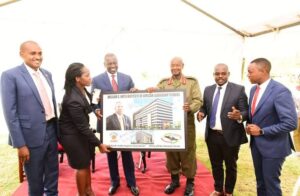
DP Ruto with Museveni during construction foundation launch of Deputy President William Ruto’s Institute of African and Leadership Studies at the Makerere University.
He knows he won’t have these options possible out of Government since he’s standing on a loose rope between freedom and prison. His conviction if the ICC case is re-opened and found guilty as charged — shall be Justice served to the 2007/08 PEV victims while his win for Presidency will be an escape goat from prosecution, conviction and shall solidify his melting political butter.
Kenya Insights allows guest blogging, if you want to be published on Kenya’s most authoritative and accurate blog, have an expose, news TIPS, story angles, human interest stories, drop us an email on [email protected] or via Telegram
-

 Business5 days ago
Business5 days agoCooking Fuel Firm Koko Collapses After Govt Blocks Sh23bn Carbon Deal
-

 Americas4 days ago
Americas4 days agoEpstein Files: Bill Clinton and George Bush Accused Of Raping A Boy In A Yacht Of ‘Ritualistic Sacrifice’
-

 Politics2 weeks ago
Politics2 weeks agoYour Excellency! How Ida’s New Job Title From Ruto’s Envoy Job Is Likely to Impact Luo Politics Post Raila
-

 Business4 days ago
Business4 days agoABSA BANK IN CRISIS: How Internal Rot and Client Betrayals Have Exposed Kenya’s Banking Giant
-

 Business2 weeks ago
Business2 weeks agoMinnesota Fraud, Rice Saga, Medical Equipment Deal: Why BBS Mall Owner Abdiweli Hassan is Becoming The Face of Controversial Somali Businessman in Nairobi
-

 News2 weeks ago
News2 weeks agoKenya Stares At Health Catastrophe As US Abandons WHO, Threatens Billions In Disease Fighting Programmes
-

 News2 weeks ago
News2 weeks agoDCI Probes Meridian Equator Hospital After Botched Procedure That Killed a Lawyer
-

 Business1 day ago
Business1 day agoKRA Can Now Tax Unexplained Bank Deposits

